Catching Terrorists Not DHS’ Job?
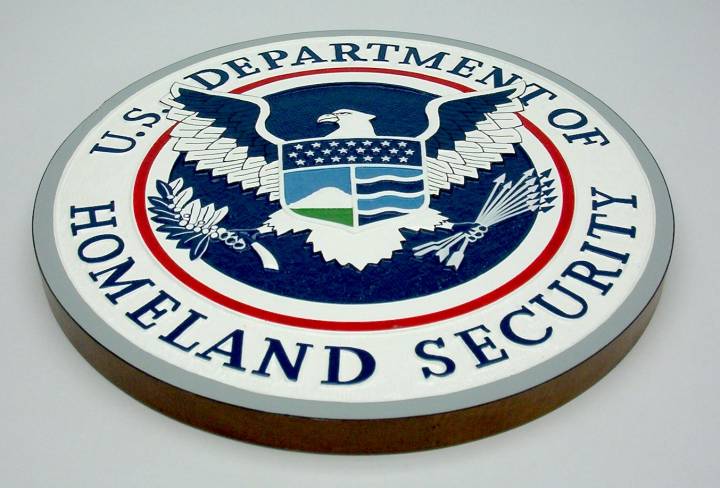 Chris Battle is surprised how often he hears the question “How many terrorists has the Department of Homeland Security caught?” He argues that DHS’ job is prevention, not apprehension; that’s what the FBI does.
Chris Battle is surprised how often he hears the question “How many terrorists has the Department of Homeland Security caught?” He argues that DHS’ job is prevention, not apprehension; that’s what the FBI does.
The implication of the question — usually the questioner already knows the answer — is that the failure to catch members of al Qaeda during the fingerprinting processes at the border, or during Border Patrol operations along the southwest land border, or during the student visa process, or during the airport screening process … the implication is that the tactics implemented by DHS are obviously failing. No terrorists.
It is important to remember, however, that we usually won’t know if the efforts are successful — at least from the perspective of stopping the next al Qaeda operative. It should be remembered that most of the September 11th terrorists who entered the United States did so by exploiting our immigration system. For example, Hani Hanjour, one of the men who helped crash a 757 into the Pentagon, entered America allegedly as a foreign student. He applied for and received his student visa, but he never set foot on the school at which he was supposedly studying. In fact, nobody ever heard from him again until that fateful morning of September 11, 2001.
Had the DHS student visa program been in place at the time, Hanjour’s failure to show up at the school for which he was given a visa would have resulted in an alert being issued to US Immigrations and Customs Enforcement. ICE would have then investigated the matter. Had they run down Hanjour, he would have been deported.
And he would never have been tagged as a “terrorist.” He would only have been an individual who was caught exploiting the immigration system — like millions of others who do the same.
So, yes, it’s true that few terrorists are “caught” by DHS. It’s also true that few terrorists who are caught will likely ever be known.
That’s fair enough, I think, if the question is being asked as a proxy for “Is DHS doing its job?”
When I ask it, though, I do so as a proxy for “Is this worth the sacrifice in liberty for ordinary Americans?” Chris is right that we’ll never know, for example, how many would-be airline hijackers have been thwarted by the more stringent airport screening procedures implemented after 9/11. We do know, however, that something like 75 million Americans fly each year and that each and every one of them is inconvenienced. That tens of millions of man-hours a year are thereby wasted getting to the airport much earlier than would otherwise be required. That Americans are so frustrated with the new rules that they’ve skipped some 41 million trips that they would otherwise have taken.
Oh, and all of the 9/11 hijackers could have passed through the current screening procedures, albeit possibly not with box cutters. But there are other weapons that would easily pass through – especially if one includes weapons that could be easily assembled aboard the plane.
None of that matters, though, because of two unarguably useful post-9/11 changes. First, we’ve hardened the cockpit doors and implemented procedures to ensure that they’re not opened — no matter what — in the even of a takeover attempt. Second, passengers have learned to go Flight 93 on would-be terrorists. Before 9/11, passengers reasonably assumed that hijackers just wanted to go to Cuba or get paid a ransom or whatever and that the passengers would likely be released unharmed afterward. Now, as Richard Reid’s almost comical attempt to blow up a plane with a shoe bomb demonstrated, passengers will overwhelm a would-be attacker.
That hasn’t stopped the TSA from making everyone take their shoes off to get through security screening, of course.

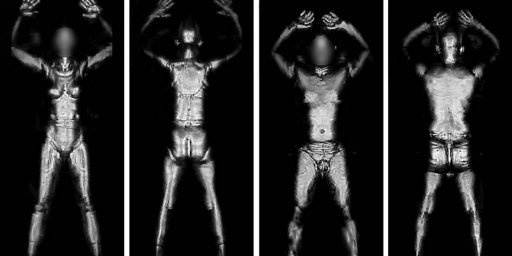
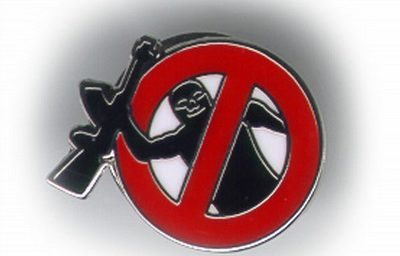
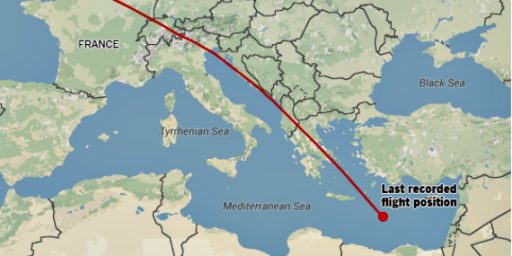
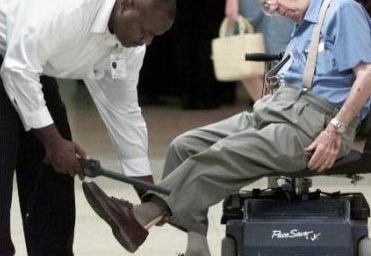
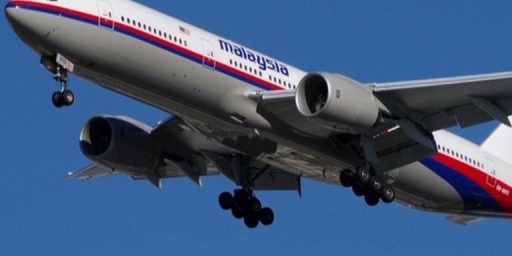
I’m highly skeptical of that claim. Here’s some evidence that indicates that people are still choosing to fly at the same rates as before. I’ll take hard data over an industry lobbying group poll every day.
Well, if the TSA would just follow my recommendation, things would be fine: We all fly buck-ass naked. (Of course, we’d have to rename the agency “T&A”–small price to pay for efficiency, I’d think.)
I’ve never been enthralled about TSA but for me the proof of the futility of its task was when I realized, sometime around 2004, that unbeknownst to me I had an X-Acto knife with me in the computer bag I routinely carried on to the plane and had done for at least two years.
This brought home to me the realization that the purpose of DHS and TSA are neither to catch terrorists nor to prevent terrorists from acting. Their purpose is to give the impression that something is being done. To that end the greater the inconvenience, the better they’re doing their jobs.
To tie two threads together, no the DHS is about copyright:
“Searches of electronic media, permitted by law and carried out at borders and ports of entry, are vital to detecting information that poses serious harm to the United States, including terrorist plans, or constitutes criminal activity—such as possession of child pornography and trademark or copyright infringement.”
http://www.dhs.gov/ynews/releases/pr_1251393255852.shtm
There was a BS claim by the DHS around that same time that al Qaeda were funding themselves by copyright infringement. Amazing BS, but it got some media lobbyist what he wanted.
Bruce Schneier has a whole lot of rants on what he calls “security theater”… Complex actions that make people feel like Something is Being Done, but don’t actually make anyone safer, and often _compound_ the problem by making everyone less observant and more likely to try to avoid burdensome precautions. I am convinced that TSA is composed pretty much entirely of security theater…
A small amount of explosive would deal with the cockpit door, and a pistol or two would cope with the passengers. It’s one thing to overwhelm a guy with a box cutter: harder if he’s carrying a .45.
So let’s not refight the last war.
The screenings serve the purpose of forcing terrorists to plan for the possibility of being caught at screening.
Yes, three guys could, let’s say, each have a relatively innocent-looking bomb component that could be assembled on-board. But that gives TSA three bites at the apple as they screen. I don’t think a gun would make it through, more to the point I don’t think the bad guys would be confident it would make it through.
If it were a multi-plane plot like 9-11 a TSA catch at any one airport would probably bring a system-wide shutdown. Another element for the bad guys to contend with.
So, no, the TSA screenings are not pointless. They raise the difficulty level for Al Qaeda. And let’s remember, terrorists have shown no evidence of being criminal masterminds.
A successful attack would cost the airlines a lot more than the screenings and cost the economy a lot more than wasted productivity off early arrivals.
legion, I think it’s only a problem when “security theater” becomes a substitute for real security. Some theater is necessary. Like it or not instilling a sense of security is something the federal government really needs to do. Theater, however, isn’t enough.
This is the sound of me rattling my stein on the table, shouting “Hear, hear!”
Airport security is a national embarrassment. I’m not much of a frequent flyer, and after a disastrous TSA experience* at DFW airport, I don’t plan to be.
(* Using two hands to carry three totes –for my bag, my laptop, and my shoes– I looked over to see my Mom, shoeless, arms out like an Abu Ghraib detainee, being wanded by a TSA employee. I could have tossed my totes in the air and rushed the guy. Instead, I opened my mouth…also known as The Jerk Store…and assaulted him with harsh language. Not in the best interests of national security? Debatable. But the only threat that day was from a freedom-loving son watching his Mom being treated like a terrorist.)
Considering the lockdown and additional security hoops that would be implemented (see: shoe bomb), wouldn’t an _unsuccessful_ attack cause the same economic impact? If so, what exactly is the TSA accomplishing? What increase in safety – real or perceived – are we getting?
I’m not so sure about that.
Last time I was bottlenecked in a security checkpoint, I thought, “Hell, they wouldn’t even need to get on the plane. Just set the bomb off right here.”
And terrorists may not be criminal masterminds, but it doesn’t take a criminal mastermind to see a crowd of defenseless people, mulling around with their shoes in their hands, and think ,”ah, a juicy target for a Mumbai-style attack.” It just takes a half-smart jihadi with a machine gun.
It’s been a few years now, but it was a few years after 9/11, that a few of us were flying one-way, to go take my cousin’s boat back.
The TSA dutifully broke us out, as high risk one-wayers, and did explosive tests on the components of our luggage.
That bugged me, because how hard would it be for a terrorist to buy a round-trip? What to save money? On a suicide flight? A little silly.
I’d say that when they do things that “look like” security, it’s theater.
Herb:
Terrorists could do any number of things. But AQ has a fondness for the spectacular and an apparent addiction to suicide missions.
See, if it was me, I’d go Lockerbie. It’s low-risk, high pay-off. But AQ love them some martyrdom.
As for your mom, if it was me and I wanted to sneak a few ounces of plastique onto a plane I might just slip it into an innocent woman’s carry-on. Not hard to do, really.
This is no doubt true, but it would be a mistake to think the AQ of 2009 is anything like the AQ of 2001. AQ09, as opposed to AQ01, has been at the receiving end of 7 years of war. Lessons have been learned, methods have been honed.
But with that said, you mentioned Lockerbie. That attack, along with the 9-11 attacks, were spectacular enough to blind us (temporarily I hope) to certain statistical truths.
Of the thousands and thousands of flights since Lockerbie, a very small number have been victim of hijackings. More planes have crashed due to “natural causes” (weather, equipment failure, pilot error, etc) than terrorist attacks. In other words, a Lockerbie/9-11 style attack is incredibly unlikely.
You are literally more likely to get struck by lightning or win the lottery than you are to be a victim of another AQ hijacking plot.
To me, you take an unlikely attack add in “passengers overwhelm(ing) a would-be attacker” and there’s no need for every single person getting on a plane to prove they don’t have bombs in their shoes.
James, you make some reasonable points that are worth a national discussion: Is the money going into DHS a reasonable return on investment? However, I’d stick to my original thesis that this is a different question than “How many terrorists has DHS caught?” — which is often posed as a way of arguing that DHS is not worth the ROI. If folks pose that as the metric, it’s not a valuable one. Moreover, it cannot be forgotten that DHS also has the role of addressing illegal immigration (regardless of any terrorists nexus) and port security (also regardless of any terrorists nexus) and smuggling (also regardless of any terrorist nexus) and so on. The idea that everything DHS does is to prevent terrorism and terrorism only is inaccurate but a widely held public viewpoint.
As for preventing terror attacks, to be frank, there are hundreds of ways terrorists could inflict damage — at an airport, at a port, at a shopping mall or state Capitol, etc. — that would not be stopped by current security measures.
This is why our overall homeland security strategic model should incorporate this reality and work resilience tactics into the strategy with far greater depth. Unfortunately, there are not too many elected officials willing to acknowledge that we can’t stop every attack and therefore need to be more focused on being able to recover quickly, with minimal loss to life and economy, than preventing 100 percent of all attacks. Just take a look at the silly cargo screening laws passed by Congress in 2007 requiring that every single piece of maritime cargo be scanned before entering the country.